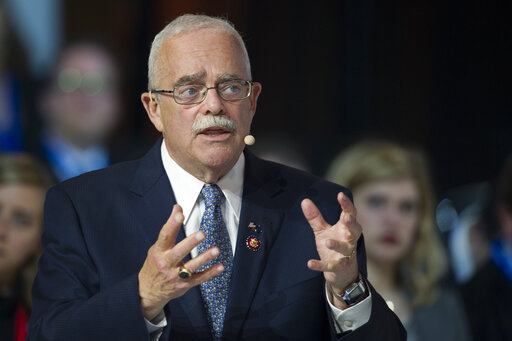
Connolly committed to oversight, not concerned about ‘overreach’
Virginia Democrat Gerry Connolly isn’t concerned with overreach as he pursues an agenda of oversight and accountability.
This story has been updated to reflect a statement provided by the Office of Personnel Management on May 1.
Rep. Gerry Connolly (D-Va.), chairman of the Oversight and Reform Government Operations subcommittee, isn’t particularly concerned with perceptions of overreach as he pursues an agenda of oversight and accountability of the executive branch.
“On my subcommittee, the first hearing I had was on a really sexy headline-grabbing kind of topic: The Merit System Protection Board,” he said during a town hall Thursday at Juniper Networks in Herndon, Virginia. “Y’all know about that? No. That’s not something you’re talking about daily? But it’s good government.”

And that’s the kind of subject Connolly said he’s committed to examining. The MSPB has been without a quorum for more than two years, and currently has no members on its board. That’s resulted in a three-year backlog of cases that need to be adjudicated, Connolly said. And with no new board members on the horizon, Connolly said he’s afraid of that backlog growing to five or even six years’ worth of cases.
“That’s not fair to federal employees,” he said. “Most are dedicated civil servants trying to do a job. And sometimes something happens in the workplace. And they want to have an adjudicator that’s their right to have a Merit Systems Protection Board. That it is not functional is a real problem for them. It’s not the sexiest topic, it’s not making headlines and cable news, but it’s vitally important to civil service.”
That’s where Connolly said his efforts are going to be focused: Oversight of government processes that have been largely ignored for the past two years. During their time in the minority, Democrats on the House Oversight and Reform committee requested 64 subpoenas on topics ranging from the security clearance process to the Census. Now that they have the majority, these issues have become the agenda.
“We have a job to do separate from the executive branch,” he said. “And making sure the executive branch is doing its job and doing it well. Throwing the flag down when it’s not, is our job.”
The current efforts to reorganize government also feature prominently on Connolly’s to-do list. He’s particularly concerned about the proposal to do away with the Office of Personnel Management, and is frustrated that OPM’s acting director, Margaret Weichert, postponed coming before the committee to explain the plans behind that proposal.
Related Stories

Senate forces ‘first’ for MSPB as the agency loses all members

2020 budget sheds little light on details behind the proposed OPM reorganization
Weichert was supposed to testify before the committee May 1, and OPM was supposed to provide documents subpoenaed by the committee at the same time. But Connolly said Weichert postponed until later in the month, and OPM postponed providing the documents as well, to time them with the new schedule for her testimony.
OPM later clarified in a statement that it had worked with Connolly’s subcommittee to determine the schedule for providing the documents, and began providing those documents to the committee the weekend after Connolly spoke.
“When the new date for the hearing was confirmed, OPM established a set date to provide documents to the subcommittee based on the same timeframe the subcommittee originally requested and OPM has already produced the responsive documents in line with that timeline,” an OPM spokesperson said.
One thing Connolly wants to ask Weichert about is the recent Executive Order to move the security clearance process out from under the purview of OPM and into the Defense Department.
“Maybe moving to DoD, you’re going to speed it up and it will be more efficient and better and more thorough, in which case you got my support,” Connolly said. “But if that isn’t the case, and if in fact you don’t have any plan at all, and you can’t answer the question, does this not just add to the problem we already got? Then I don’t support it. And that’s why we want Weichert … to come before us and explain it.”
Federal IT
Outside of his government operations oversight commitments, Connolly’s other major goal is continuing the reform and modernization of federal IT. As the co-author of the Federal Information Technology and Reform Act (FITARA), he’s working to consolidate data centers, facilitate moving to the cloud, and solidifying and reinforcing the role of chief information officer across government.
“I think the next steps of FITARA, I think are all oversight steps, not legislative steps, because we feel that the bill is pretty comprehensive and creates a framework that works,” he said. “The question is compliance, not sliding back. How committed is the administration? They talk a good game about their innovation agenda. But if you look across the board, they’ve been backsliding on the dashboard. They’re backsliding on data center consolidation, they’re backsliding on deployment of technology and simple things like telework. So how committed are they?”
Connolly said one area that is falling short is the role of CIOs. He’s concerned that most of them still seem relegated to a second tier of the C-suite, without enough authority to live up to their responsibilities.
He said he describes the problem to the private sector by asking companies how many CIOs they have. Confused by the question, they always answer that they only have one.
“So the federal government — 24 agencies — has 250 people called CIO,” Connolly said. “And that means no one’s in charge, no one has responsibility, no one can be assigned responsibility, but also no one’s empowered to make the decisions that need to be made. So changing that hierarchy is also a critical part that we’re making progress in some agencies, but we need to do more.”
But there are two possible exceptions to his philosophy of “oversight steps, not legislative steps.” The first is the Modernizing Government Technology (MGT) Act. He said general counsels have raised issues with the provision of the law that says agencies can reinvest savings accrued by moving away from legacy technologies into programs pursuant to FITARA. They say that’s an appropriations prerogative.
But Connolly said from his point of view, that’s been passed into law. Agencies have been granted that authority. So that disagreement needs to be worked out.
Second, he said, is FedRAMP.
“We want to codify it right now. It’s not codified,” Connolly said. “So, you know, frankly, tomorrow morning, someone could just jump in there and have a whole new system. And that doesn’t serve anyone’s interest. From our point of view, even with the bad, we think we can fix it and regularize this and return it to what it was intended to be: a low-cost, expeditious certification for you to provide services to the federal government.”
What he’d like to see, he said, is the Joint Authorization Board become the gold standard. Right now, a contractor can become JAB certified, but still have to certify with 24 other agencies. That can cost contractors a lot of time and money. And while he can see some special allowances for certain kinds of specialized approvals, he said the idea of having to certify at each individual agency simply makes no sense.
Copyright © 2025 Federal News Network. All rights reserved. This website is not intended for users located within the European Economic Area.
Daisy Thornton is Federal News Network’s digital managing editor. In addition to her editing responsibilities, she covers federal management, workforce and technology issues. She is also the commentary editor; email her your letters to the editor and pitches for contributed bylines.
Follow @dthorntonWFED



